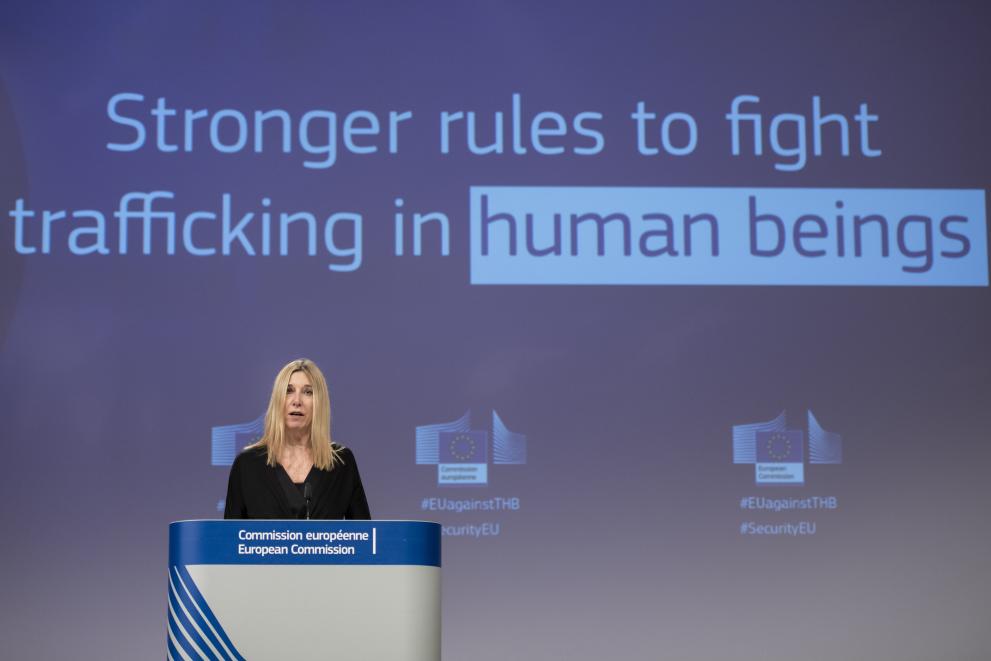
Vienna/Brussels (Austria/Belgium) 27 July 2023 - The latest global research on human trafficking trends illustrates a worldwide slowdown in criminal justice response to this crime, with both a decrease in victim detection rates and in the number of convictions.
The Global Report on Trafficking on Persons, which is released biennially by the United Nations Office on Drugs and Crime (UNODC), showed that detection rates fell by 11 percent in 2020 with a 27 percent drop in the number of convictions.
The EU Report on the progress made in the fight against trafficking in human beings, published by the European Commission in December 2022, also indicates a decrease in detected victims in 2020 within the European Union.
These alarming findings prompted the UNODC to mark the 2023 World Day Against Trafficking in Persons with a call to governments, law enforcement, public services, and civil society and a push to enhance their efforts to prevent human trafficking, identify and support victims, and prosecute traffickers.
“Our message this year is clear – ‘reach every victim of trafficking, leave no one behind’,” says John Brandolino, UNODC Director of the Division for Treaty Affairs. “The European Union is a key partner for UNODC and together we strive to strengthen global anti-trafficking responses.”
UNODC, with the support of the EU, delivers legal and technical expertise for crime prevention and criminal justice agencies and victim support organisations in several regions of the world, especially in low-income countries.
“The message for the 2023 World Day Against Trafficking in Persons ‘reach every victim of trafficking, leave no one behind’ is also the basis of the EU Strategy,” underlined Diane Schmitt, the EU Anti-Trafficking Coordinator.
“With a comprehensive approach including prevention, raising awareness, reduction of demand, early detection of victims and their protection, with UNODC and other partners, all together we can make a positive difference on the ground for victims.”
Through GLO.ACT, a joint initiative between UNODC, the EU and the International Organization for Migration (IOM), partner countries in Asia and the Middle East are assisted in the development and implementation of robust and effective anti-human trafficking strategies.
“Potential victims and survivors of human trafficking receive tailored assistance and frontline workers are trained on victim support and child protection,” said Mr. Brandolino. “Such measures ensure that the needs and rights of trafficking victims are of central importance in criminal justice systems.”
Over the past three years, despite the limitations caused by the COVID pandemic, UNODC has implemented an EU-funded project to dismantle human trafficking criminal networks in North Africa and the Middle East.
“Through our work, law enforcement and criminal justice officials in the region are now better equipped to detect, intercept and investigate cases of human trafficking and assist and protect the victims involved,” said John Brandolino.
The EU, as the only regional organization that is party to the United Nations Convention against Transnational Organized Crime and the Human Trafficking Protocol, also plays an important role in policy design within the United Nations.
“Too many victims remain undetected, which is why improving early identification and referral for assistance and support for trafficking victims is crucial,” explained Diane Schmitt. “This will contribute to enhancing the protection of victims.”
The European Union is currently revising the EU Anti-Trafficking Directive to make it mandatory for Member States to establish national referral mechanisms for the early identification and referral of victims to specialised assistance and support.
The 2023 World Trafficking Day campaign aims to bring attention to the escalating trafficking risk caused by global crises, conflicts, and the climate emergency.
Displacement, poverty, and limited access to education and employment are impacting millions of people worldwide, leaving them vulnerable to exploitation by traffickers.
Details
- Publication date
- 27 July 2023
- Author
- Directorate-General for Migration and Home Affairs
